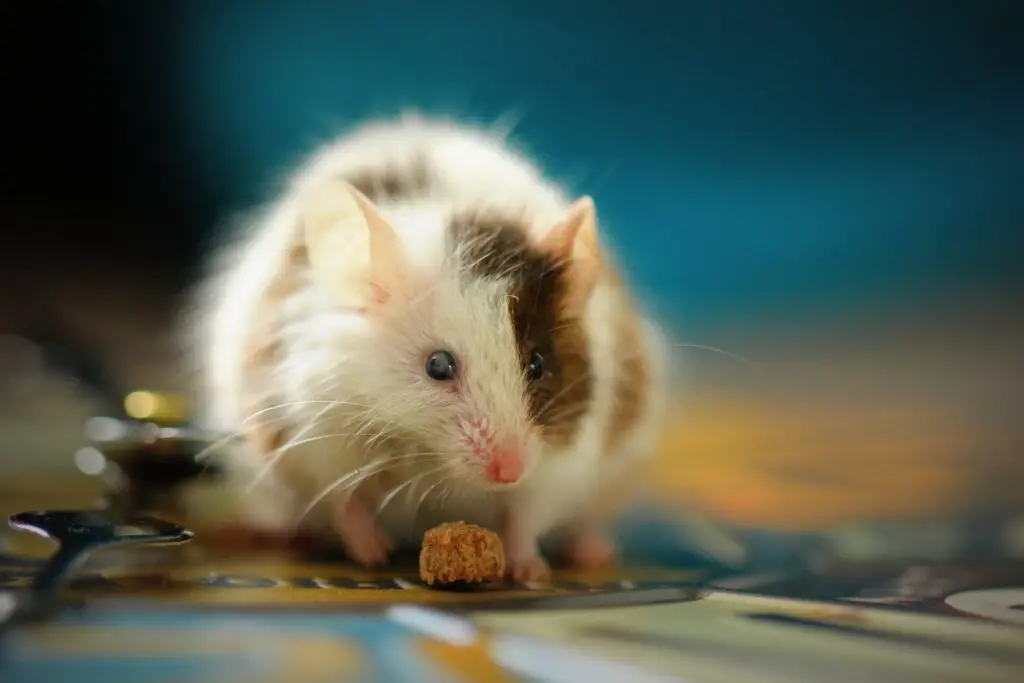Many seek to rid mice, knowing these pests can carry diseases and contaminate homes with harmful bacteria found in mice droppings. Homeowners often consider using bleach to repel these unwanted guests, lured by the pungent bleach fumes believed to drive rodents away.
Yet, it’s crucial to remember that while bleach might deter mice, it poses risks to pets and children, and may not address the root cause of a mouse infestation. Thus, in some cases, professional rodent control may be more effective than DIY solutions, especially when dealing with an established mouse infestation, where they have ample sources of what mice eat.
Understanding the Effects of Bleach on Mice
Mice have a keen sense of smell and can smell bleach, which is overpowering and irritating to them. While the strong odor may temporarily rid mice by interfering with their olfactory navigation, it’s not a guaranteed long-term solution. Mice can quickly adapt or find ways to avoid the treated areas, making bleach an unreliable solo strategy for rodent control.
The Chemical Reaction: How Bleach Affects Mice
Bleach emits a strong scent that can repel mice temporarily. When mice smell bleach, they’re likely to avoid the area due to the overwhelming and unpleasant odor. However, this reaction is a short-term deterrent rather than a permanent solution for those looking to rid mice from their homes.
Duration of Effectiveness: How Long Does Bleach Keep Mice Away?
Although bleach can deter rodents, its effectiveness as a mouse deterrent is short-lived. To maintain a rodent removal strategy, one might mop the floors or spray bleach in problem areas frequently. However, this method does not guarantee repelling mice indefinitely, and these animals can spread diseases if not managed properly.
Alternative Natural Scents That Deter Mice
For those seeking a mice infestation solution, natural scents can deter mice without the use of harsh chemicals. Dryer sheets and other scents that mice hate can be more pleasant alternatives for humans while still creating an unwelcoming environment for rodents. Such natural scents, when used consistently, may help to maintain a mouse-free home.

Peppermint Oil: A Natural Mouse Repellent
Amidst an array of rodent repellents, peppermint oil stands out as a natural choice to combat a mouse infestation. Its intense aroma is disliked by mice, offering a more user-friendly and environmentally conscious method to deter these pests without resorting to toxic chemicals.
The Power of Cleanliness: What Cleaning Products Do Mice Dislike?
Mice hate the smell of many cleaning products, making cleanliness a simple yet effective way to deter mice. Regular cleaning reduces food residues that attract mice, further discouraging their presence.
Using Cotton Balls Soaked in Bleach as a Deterrent
Placing cotton balls soaked in bleach in strategic locations can act as a cleaning agent and a deterrent. The strong odor can help repel mice temporarily, but this should be part of a broader pest control approach, given the potential risks associated with bleach. Check more about this here.
Myths vs Facts: The Reality Behind Common Mouse-Deterrent Methods
The battle against a rodent infestation is filled with tales of what works and what doesn’t. While some swear by certain methods to repel rats or mice, it’s essential to distinguish between anecdotal successes and scientifically proven strategies.
Do Mice Avoid Bleach? Separating Myth from Reality
Household Remedies: What Truly Works to Repel Mice?
Among household remedies, essential oils and bleach fumes are popular choices to repel mice, but their effectiveness can vary. Mice droppings indicate areas where bleach might be applied to repel the pests, yet the dangers they carry and the potential risks to pets and children should be considered. In cases of a serious infestation, professional rodent control should be sought to ensure complete removal of mice and the harmful bacteria they leave behind.
Creating a Mouse-Repellent Environment
While some may use bleach to repel mice, it’s important to integrate this tactic into a broader strategy that includes cleanliness, sealing entry points, and using natural deterrents for a comprehensive approach to rodent control.
Preventative Pest Control: Key Measures to Consider
Preventing a mouse infestation begins with proper sanitation and maintenance. Sealing off entry points, like cracks and holes in walls, floors, and foundations, is critical. It’s equally important to eliminate food sources by storing food in sealed containers and disposing of garbage regularly. Reducing clutter can also deter nesting. These steps make the environment less inviting for mice, reducing the likelihood of an infestation.
Strategies for Long-Term Rodent Prevention
Maintaining a rodent-free environment requires ongoing vigilance. Routine inspections for signs of mice, such as droppings or gnaw marks, can catch problems early. Implementing landscape management, like trimming vegetation away from the structure, will discourage mice from getting close. Additionally, adopting a consistent cleaning schedule and using deterrents like essential oils can contribute to a long-term solution against rodent invasion.

An In-Depth Analysis of Bleach as a Mouse Repellent
Analyzing the efficacy of bleach as a mouse repellent requires understanding both its chemical properties and the behavioral patterns of mice. While bleach can temporarily disrupt the scent trails mice rely on, its effectiveness and safety as a long-term deterrent are questionable, and it may not be the most practical or compassionate method for managing rodent populations.
The Science Behind Using Bleach Against Rodents
Bleach contains harsh chemicals that produce a potent odor undesirable to rodents. When used in areas mice frequent, it can disrupt their olfactory cues and make the environment less attractive. However, the effectiveness of bleach as a mouse deterrent is limited, as mice carry a strong survival instinct and may tolerate unpleasant conditions if other resources are available.
Practical Application: How to Use Bleach for Rodent Control
To use bleach for rodent control, one must carefully apply it to areas you suspect mice inhabit, focusing on entry points, corners, and pathways. It should be diluted and used sparingly to minimize risks to humans and pets. However, relying solely on bleach is not recommended; it should be part of a comprehensive pest management strategy that includes sanitation and exclusion methods.
Concluding Insights: Does Bleach Really Repel Mice?
In the battle for mice control, bleach has been a topic of much discussion. While bleach breaks down into substances that can disrupt oxygen intake and harm epithelial cells, its strong, unpleasant smell can indeed repel mice and other pests temporarily. However, the concentrated essential oils such as peppermint spray and clove oil may serve as more effective mouse repellents. Putting bleach in areas frequented by rodents could pose a risk to your health and that of humans and pets.
Therefore, while bleach continues to be a common household item for dealing with mice, it’s essential to weigh its use against safer and more dedicated mice control and prevention methods. Strategies involving cat litter, which carries the scent of predators like cats, or natural deterrents like chili oil and apple cider vinegar, can be more sustainable and pose less risk while effectively keeping rodents at bay.

